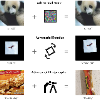Adversarial Training (AT) is one of the most effective methods to enhance the robustness of DNNs. However, existing AT methods suffer from an inherent trade-off between adversarial robustness and clean accuracy, which seriously hinders their real-world deployment. While this problem has been widely studied within the current AT paradigm, existing AT methods still typically experience a reduction in clean accuracy by over 10% to date, without significant improvements in robustness compared with simple baselines like PGD-AT. This inherent trade-off raises a question: whether the current AT paradigm, which assumes to learn the corresponding benign and adversarial samples as the same class, inappropriately combines clean and robust objectives that may be essentially inconsistent. In this work, we surprisingly reveal that up to 40% of CIFAR-10 adversarial samples always fail to satisfy such an assumption across various AT methods and robust models, explicitly indicating the improvement room for the current AT paradigm. Accordingly, to relax the tension between clean and robust learning derived from this overstrict assumption, we propose a new AT paradigm by introducing an additional dummy class for each original class, aiming to accommodate the hard adversarial samples with shifted distribution after perturbation. The robustness w.r.t. these adversarial samples can be achieved by runtime recovery from the predicted dummy classes to their corresponding original ones, eliminating the compromise with clean learning. Building on this new paradigm, we propose a novel plug-and-play AT technology named DUmmy Classes-based Adversarial Training (DUCAT). Extensive experiments on CIFAR-10, CIFAR-100, and Tiny-ImageNet demonstrate that the DUCAT concurrently improves clean accuracy and adversarial robustness compared with state-of-the-art benchmarks, effectively breaking the existing inherent trade-off.
翻译:暂无翻译




